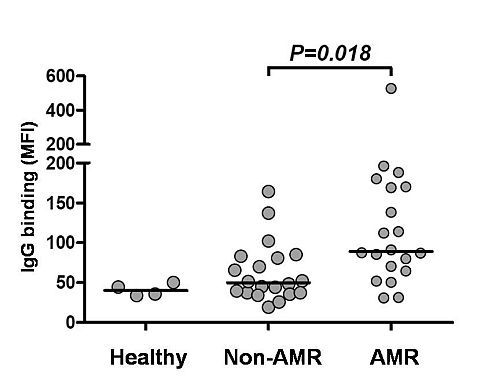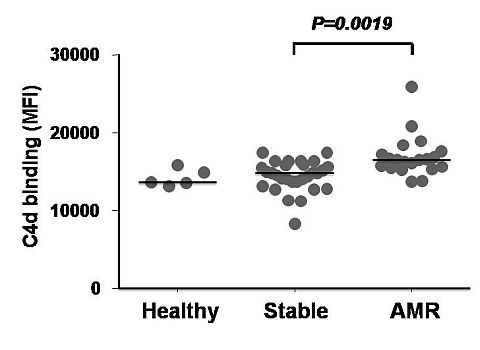Humoral Rejection of Human Kidney Grafts Associates with Polyreactive Antibodies That Bind Apoptotic Cells and Activate Complement
Massachusetts General Hospital, Boston
University Hospital of Parma, Parma, Italy
Meeting: 2013 American Transplant Congress
Abstract number: A659
Antibody Mediated Rejection (AMR) is associated with a variety of graft-reactive antibodies following kidney transplant. To characterize these antibodies, we immortalized 107 B cell clones from a patient with humoral rejection. The reactivity of clones’ supernatants to autoantigens, HLA and apoptotic cells was tested by ELISA, Luminex and Flow cytometry respectively. Six of 107 clones were reactive to multiple self-antigens, hence displaying a profile of polyreactivity. All 6 clones were also reactive to apoptotic but not viable cells. More generally we observed a nearly perfect overlap between polyreactivity and reactivity to apoptotic cells. Functionally, these polyreactive antibodies have the capacity of activating complement, resulting in C4d deposition at the surface of target cells. Testing the serum reactivity of 40 patients revealed higher serum reactivity to apoptotic cells amidst AMR.

Lastly, we observed that serum IgG of AMR patients also promotes complement activation as detected by an increased C4d binding on apoptotic cells.

In conclusion, we show that polyreactive antibodies develop during humoral rejection and that they can participate in serum reactivity to self antigens and HLA. Through their capacity to bind apoptotic cells and activate complement, these antibodies may participate in dead cell clearance and inflammation in injured tissues. Further studies are now warranted to determine their precise contribution to the pathophysiology of graft rejection.
To cite this abstract in AMA style:
Porcheray F, Fraser J, Gao B, McColl A, DeVito J, Dargon I, Helou Y, Wong W, Girouard T, Saidman S, Colvin R, Palmisano A, Maggiore U, Vaglio A, Smith R, Zorn E. Humoral Rejection of Human Kidney Grafts Associates with Polyreactive Antibodies That Bind Apoptotic Cells and Activate Complement [abstract]. Am J Transplant. 2013; 13 (suppl 5). https://atcmeetingabstracts.com/abstract/humoral-rejection-of-human-kidney-grafts-associates-with-polyreactive-antibodies-that-bind-apoptotic-cells-and-activate-complement/. Accessed February 16, 2026.« Back to 2013 American Transplant Congress
